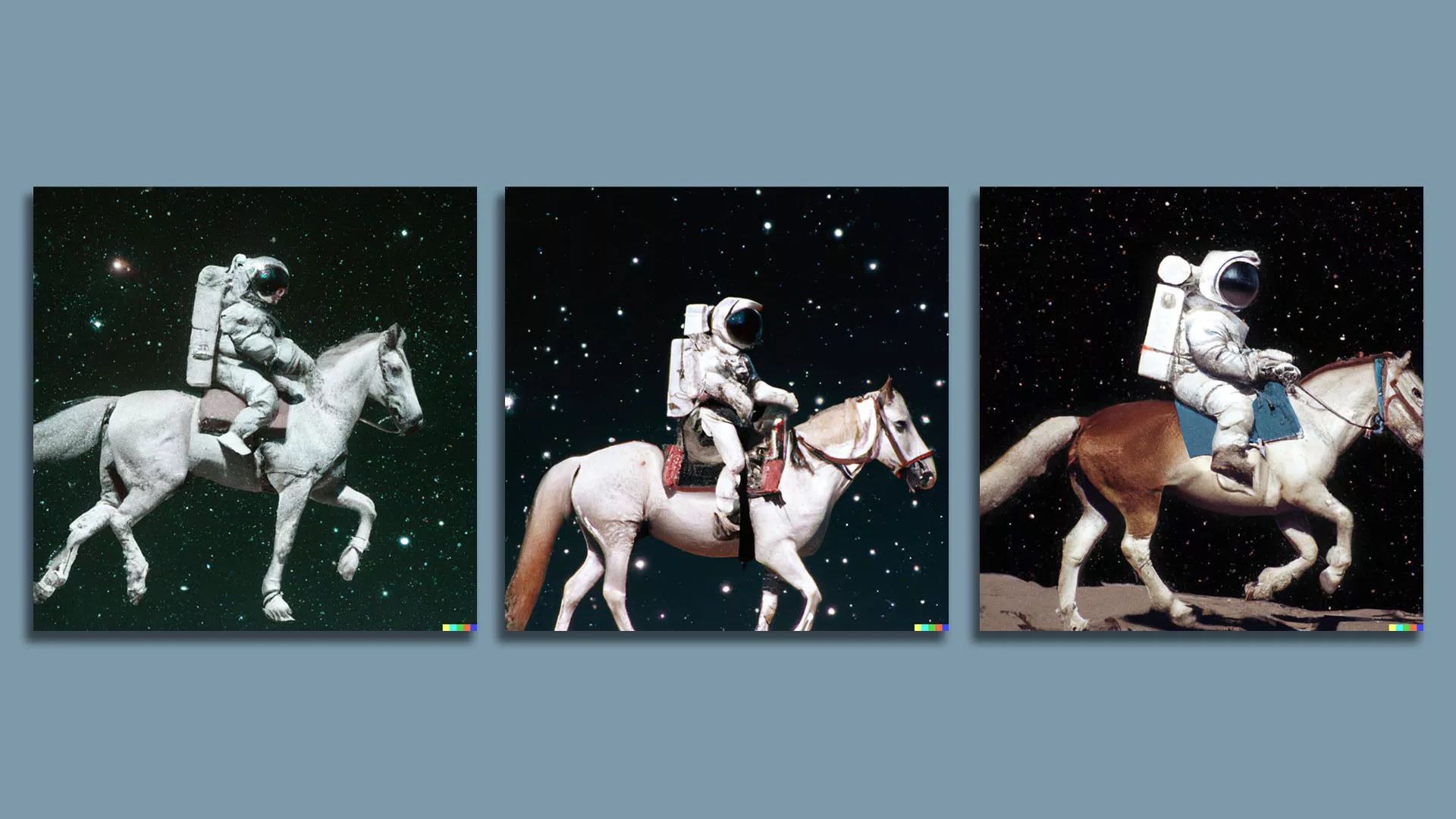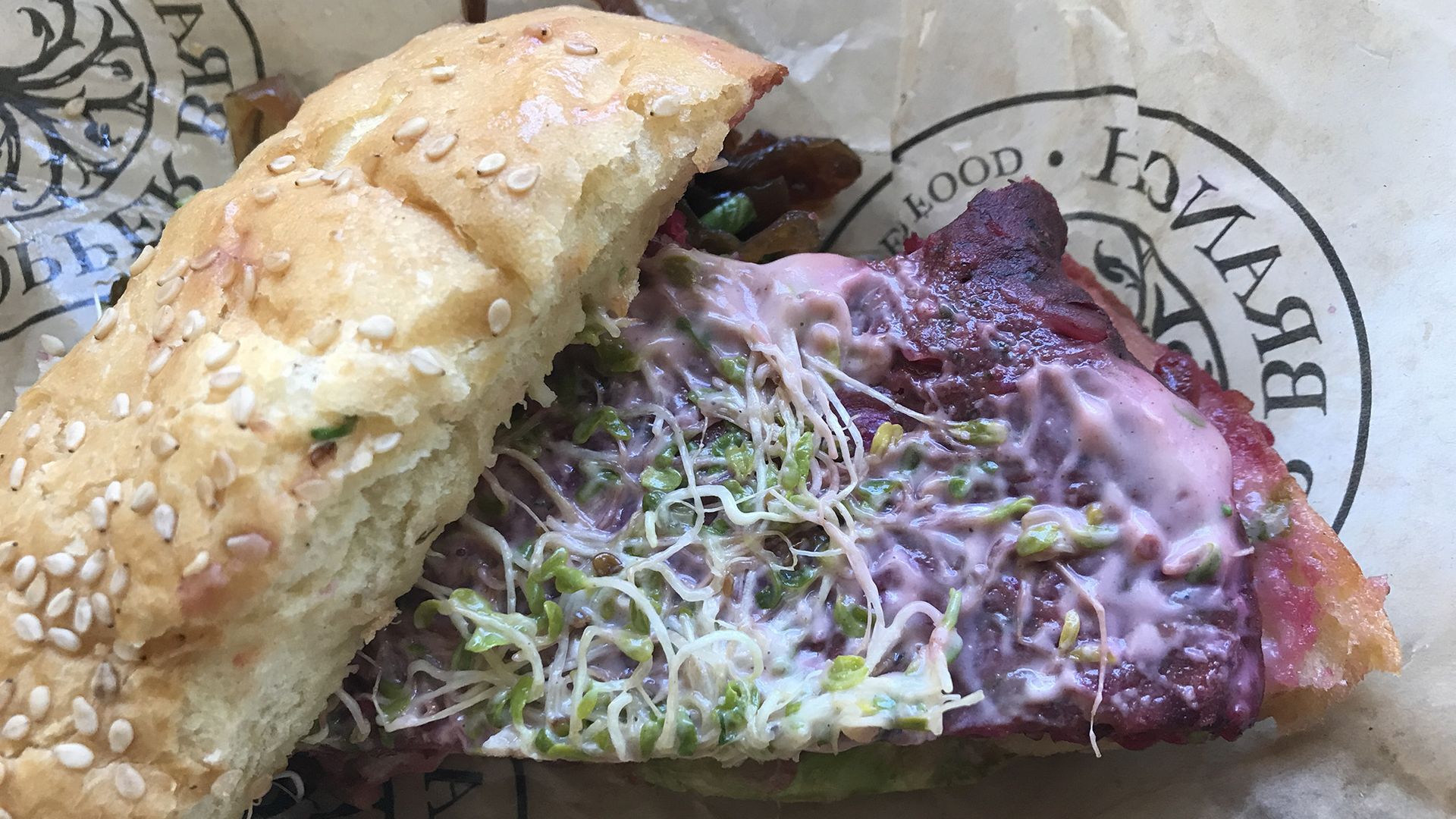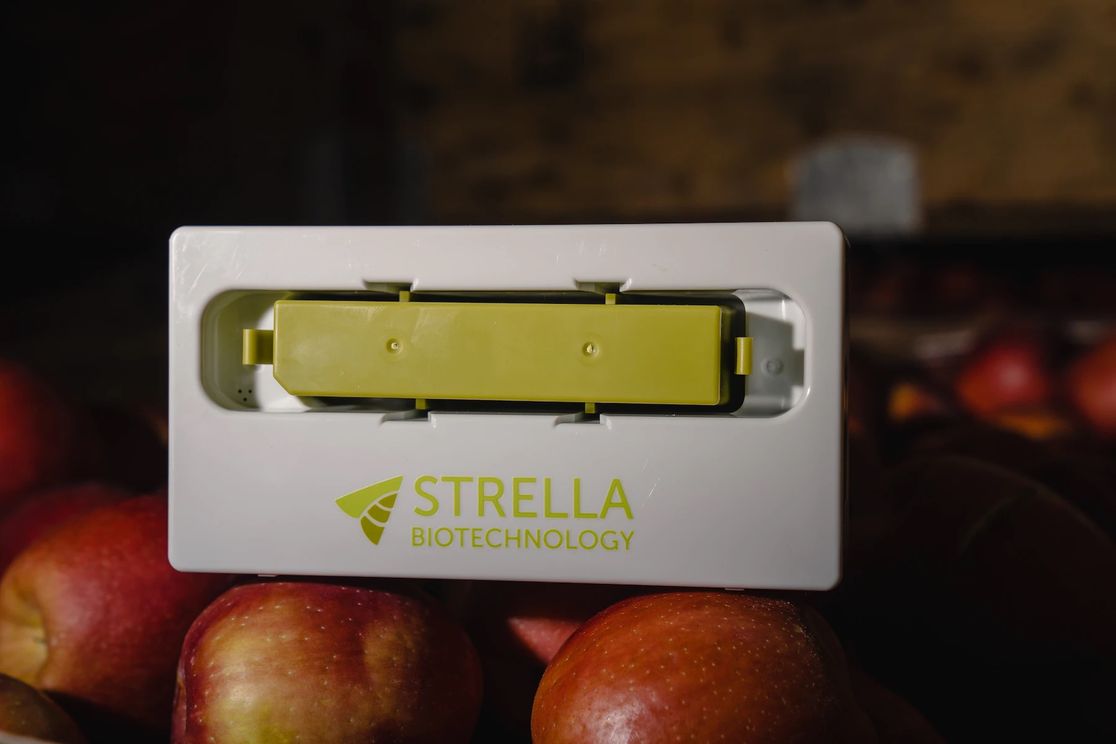| | | | | | | Presented By General Motors | | | | Axios What's Next | | By Jennifer A. Kingson and Joann Muller · Apr 12, 2022 | | A neologism that Jennifer learned on Monday: "stresslaxation." - Urban Dictionary says it's "being so stressed that relaxing makes you more stressed because you're not working on what's making you stressed."
- Fast Company tells us that between 30% and 50% of people suffer from it, getting "symptoms of stress (such as rapid heart beat or sweating)."
Here's hoping that reading "What's Next" is a pleasant diversion, not a stressful one! 🗓 Tune in today at 12:30 p.m. ET for a candid discussion on what it takes to be an exec in 2022, hosted by Axios Finish Line co-author Erica Pandey. Register to join. Today's Smart Brevity count: 1,161 words ... 4.5 minutes. | | | | | | 1 big thing: Quashing mushy apples and rock-hard pears |  | | | Illustration: Aïda Amer/Axios | | | | A startup's novel sensor device — which measures the gas emitted by fruit as it ripens — is making inroads in ensuring that only peak-ripe produce makes its way to grocery shelves, ideally reducing food waste, Jennifer A. Kingson writes. Why it matters: The USDA estimates that 30%-40% of the food supply isn't consumed. IoT sensors from Strella Biotechnology determine which pieces of fruit should be put up for sale and when — making it more likely that consumers will savor them, not toss them. Driving the news: Strella Biotech, a 3-year-old startup led by science prodigy Katherine Sizov, already works with half the nation's pear- and apple-packing houses, monitoring storerooms to recommend which fruits should be sent to market based on their maturity. - The company's iPhone-size sensors monitor ethylene, a gas that fruits and vegetables produce.
- Strella has tracked billions of apples and pears, and is starting to work with kiwi fruit as it's shipped to the U.S. from Australia and New Zealand.
- The next frontier: avocados.
One of Strella Biotechnology's IoT sensors. Photo courtesy of Strella Biotechnology In the typical grocery store, "the avocados are either way too hard or way too mushy," says Sizov, who developed the technology as an undergraduate studying molecular biology at the University of Pennsylvania. - "You end up spending two bucks apiece for a whole bag, and then half of them go bad before you even put them away."
- Most farmers rely on intuition and data to select the fruit they send to market, Sizov tells Axios, "but by the time it gets to Costco or Walmart or Target, they're basically getting a black box."
Where it stands: By working with large retailers, Strella has found "that just by changing the order in which they're sending product to the store, and the order in which they're receiving product, we're able to reduce the shrink — or food waste — on the store shelf by up to 50%," Sizov says. The big picture: The "agtech" sector, which aims to improve crop yields and food quality using technology improvements, has attracted lots of capital. - Strella is backed by Millennium Technology Value Partners, Mark Cuban, Yamaha Motor Ventures and GV, formerly known as Google Ventures.
Read the full story. |     | | | | | | 2. Here come the EVs |  Data: Environmental Defense Fund; Chart: Axios Visuals A pair of new analyses show how electric cars are becoming increasingly mainstream, with a lot more on the way, writes Ben Geman of Axios Generate. Driving the news: The research firm BloombergNEF estimates that the number of plug-in vehicles on the world's roads will top 20 million in June. - "That's remarkable growth from only 1 million EVs on roads in 2016," writes Colin McKerracher, a top BloombergNEF transport analyst.
- He sees the number reaching over 26 million by the end of the year.
Why it matters: "The speed of growth is much faster than many incumbents in the automotive and oil industries were expecting just a few years ago," McKerracher writes. The intrigue: While China and Europe are the biggest markets, a separate report by the consultancy ERM notes the growing availability of models in the U.S. - The number of fully electric and plug-in hybrid vehicles for sale under $100,000 will be well above 100 by mid-decade, per the analysis prepared for the Environmental Defense Fund.
- That includes a growing number of SUVs and pickups.
Read the rest. |     | | | | | | 3. Gen Z's new favorite app |  Data: Apptopia; Chart: Thomas Oide/Axios Downloads of BeReal, Gen Z's hot new social media app, have skyrocketed in recent months, giving the world's mobile-first generation a new way to connect throughout the work or school day, writes Sara Fischer of Axios Media Trends. Why it matters: With so many apps fighting to get even a small sliver of Gen Z's attention, BeReal has pulled ahead by getting users not to overthink what they post. How it works: BeReal encourages users to send one post every day to their friends to show exactly what they're doing in real time. - In a push toward authenticity, the app snaps photos from the phone's front and back cameras simultaneously, showing where you are and what you're doing.
- Because users have to send posts within two minutes of getting a randomly-timed notification, they don't have time to make fancy adjustments. Also, the app doesn't include any photo editing tools.
- A user who misses the two-minute window can upload a picture later, but followers will be notified that they didn't post in real time.
Be smart: BeReal has gained popularity as an antidote to the pressure young users now face to be creative and look perfect online. Read the full story. |     | | | | | | A message from General Motors | | Reinventing how we power the wheel | | |  | | | | We're driving toward a new era of mobility with 30 electric vehicles globally by 2025. As we bring the world into an all-electric future, there'll soon be an EV for everyone on a scale previously unseen. Learn more. | | | | | | 4. AI algorithm can sketch what you type |  | | | Results generated by DALL-E 2 in response to the prompt "astronaut riding a horse." Image: OpenAI | | | | OpenAI has announced a new algorithm that can produce realistic images from a text prompt, Axios' Alison Snyder reports. The big picture: As advancements in artificial intelligence surge forward, projects like DALL-E 2 could help researchers create systems that visualize the world around them. How it works: OpenAI's text generator GPT-3 builds on a prompt to predict what word would most likely come next in a sequence. - The image generating algorithm DALL-E 2 works in the same way but its palette is pixels, not words.
- It uses a language model called CLIP to first take a text prompt and try to produce dots with features that represent the prompt.
- Then it uses a neural network to render an image that tries to match the text provided.
In a demo with Axios, researchers showed off a range of images DALL-E 2 can generate — from "teddy bears mixing sparkling chemicals as mad scientists" to "an ibis in the wild painted in the style of John Audubon." - "It's really fascinating," says OpenAI research scientist Prafulla Dhariwal. "It's like watching art being generated through math, and it is kind of magical."
But, but, but ... DALL-E 2 does make mistakes. - It struggles when asked to count large numbers of features — for example, if you ask it to draw a cat with eight legs.
Read the full story. |     | | | | | | 5. Yum! It's hemp. |  | | | The Copper Burger from Copper Branch in Fort Lauderdale features a beet patty with brown rice, pea protein, sesame seeds, hemp seeds and sunflower seeds, topped with Dijon vegenaise and alfalfa sprouts. Photo Michael Mayo/Sun Sentinel/Tribune News Service via Getty Images | | | | One of the top food trends, according to the Specialty Food Association? Hemp, Jennifer writes. What's happening: Hemp seeds "have become a popular health food for their protein, fiber, omega-3 and omega-6 fatty acids, and other nutrients," Allrecipes tells us — and reminds us that while hemp comes from the same species of plant as cannabis, it won't get you high. - Hemp seeds "taste similar to sunflower seeds, somewhat like pine nuts, and a little like walnuts too."
Driving the news: The Specialty Food Association (SFA) identified hemp as a standout at its Winter Fancy Food Show, where it cropped up in alternative burgers, dressings and as an ingredient in chocolate. - "Hemp emerged as a star ingredient rich in protein, healthy fats, and essential fatty acids, as well as a sustainable crop," the trade group wrote.
Other trends the SFA spotted: Dates are proliferating as snacks and as sweeteners, and peppers of all heat levels are cropping up as well. - "Snacks with benefits" are a thing, "from nutrient-rich chocolate bars to pizza crust made from carrots."
- So are "alternative comfort foods," like chickpea butter and cream cheese made from sunflower seeds.
Share this story. |     | | | | | | A message from General Motors | | Reinventing how we power the wheel | | |  | | | | We're driving toward a new era of mobility with 30 electric vehicles globally by 2025. As we bring the world into an all-electric future, there'll soon be an EV for everyone on a scale previously unseen. Learn more. | | | | Was this email forwarded to you? Get your daily dose of What's Next magic by signing up for our free newsletter here. |  | It's called Smart Brevity®. Over 200 orgs use it — in a tool called Axios HQ — to drive productivity with clearer workplace communications. | | | | | | Axios thanks our partners for supporting our newsletters. If you're interested in advertising, learn more here.
Sponsorship has no influence on editorial content. Axios, 3100 Clarendon Blvd, Suite 1300, Arlington VA 22201 | | | You received this email because you signed up for newsletters from Axios.
Change your preferences or unsubscribe here. | | | Was this email forwarded to you?
Sign up now to get Axios in your inbox. | | | | Follow Axios on social media:    | | | | | |










No comments:
Post a Comment